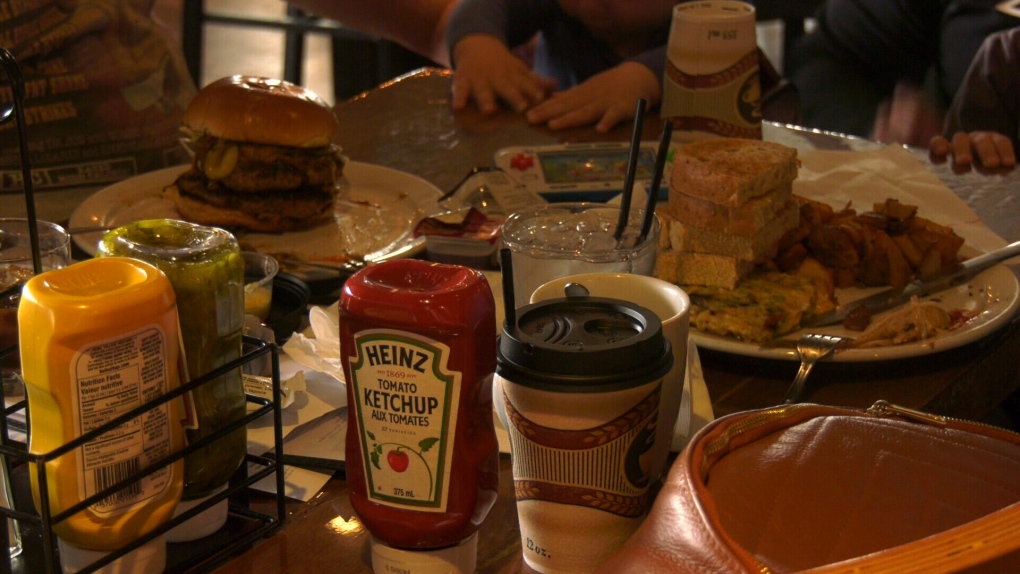“I can tell you that the people that are doing it aren’t the people who are coming here because they’re looking for a sandwich because they’re hungry,” said Ravi Ramberran, “It’s the people who are not afraid of consequences period.”
In the wake of the increase in dine and dashers, Ramberran said his restaurant has ramped up how they deal with it.
“We blast them on Facebook, we hold them, we make them wait for the cops…We do what’s in our power to do.”



deleted by creator
I don’t think anyone’s suggesting tips should be banned. It’s just that tips shouldn’t be expected from each customer. Someone working at any given fast food restaurant (not to mention other low level service jobs) is working just as hard as a server at a sit down restaurant for the same pay. Why should I be expected to tip one and not the other? Also, why is 15-20% considered a proper tip? 10% shouldn’t be treated like it’s an insult.
deleted by creator
The industry decides that profits come before everything else. Large restaurant corporations could easily charge the same amount, pay workers more (with the add on effect of customers saving money by not having to tip), and take a hit to profits. Unfortunately, our legal system doesn’t punish businesses for not paying workers a livable wage or for using tips to deceptively price goods to overcharge consumers. Instead, it’s illegal to not abide by fiduciary duty in the pursuit of infinite profits. Due to this, I can’t see the tipping culture going away anytime soon. It isn’t the consumers who are driving this, it’s the restaurant industry.
deleted by creator
Businesses prefer tipping because they don’t need to provide benefits or scheduling for their employees. When they are slow, they aren’t paying for all the staff hanging around. When it is busy, they still aren’t paying their staff, but they have even more because people want to work for tips when it is busy. And when their employees act up, the customers are the ones who deal with it.
Tips let businesses staff for peanuts while punishing their employees with terrible schedules so they quit instead of being fired and getting unemployment.
Businesses love tipping culture.
I agree 100% especially given the behaviors that our current economic system incentivizes. I was simply responding to what you said about consumers preferences driving tipping culture instead of the industry.
Although consumers in North America feel comfortable and good about tipping, this tradition primarily stems from the push to increase profits by underpaying workers and offsetting their deserved pay with the “merit” based tipping system. It’s a clever trick that feeds into the idea that “the harder your work, the more you get paid”.
I don’t think this system will change unless profit is removed as the main factor in driving a business. Not to mention our legal system discourages and even prosecutes those who attempt to undermine the growth of a company against shareholder interests.
The only places this works is in privately owned businesses where the people who run it have the authority to prioritize paying employees over profits. However, this opens the door for businesses to reduce prices by cutting wages which undercuts the private business used in this example and could lead them to go out of business.
This example is basically to state that in order to eliminate the tipping culture and give workers the pay they deserve, the entire industry needs to change. One private company cannot be solely responsible for this change since another can come in and eliminate them. Now do I think this will happen? NO!
deleted by creator
I see what you mean. It is true that if the restaurant wage problem was solved tipping wouldn’t go away overnight, especially since many consumers in North America are used to the idea of tipping. However, I do believe it would slowly become less common as it is in other countries.
In places where tipping is less common, customers view the prices as fully baked in. What they pay includes the price of the food and providing enough so their workers can live. There’s no guilt over not tipping. Some people may if they like the service, but most won’t. Additionally, the consumer is able to make a more informed choice since they are able to see the actual cost of their meal. They also don’t have to choose having the soup vs. tipping someone enough to live.
I think my main point is that random patrons shouldn’t be able to determine whether someone can pay rent after working 12 hour shifts for a month. Letting the consumer split the cost of a transaction between the business and the worker is always a losing situation for the worker. The cost of the food is fixed, the business will always make X amount of dollars per transaction. Meanwhile, tipping is variable so the worker is never guaranteed a fair sum.
If workers were paid properly then tipping would be viewed as an actual reward for doing a good job instead of a restaurant worker subsidy program as it currently stands. As I see it, the whole industry needs to change with actual laws backing up it up or else a few bad actors can ruin everything in the name of wanting to be profitable.
deleted by creator
I am on the Artemis app for Kbin which hasn’t been updated to allow quoting yet so excuse the strange formatting. Each of the following paragraphs will address each point in order.
1: Wages will certainly not adjust if tipping went away, there would just be less workers willing to take those roles. It’s not the workers keeping wages artificially low, it’s the restaurants owners who do. Having workers successfully demand higher wages on an industry wide scale just isn’t feasible without unionization. Sure there may be individual situations where workers actually get a raise but I don’t see this being the norm. Employers do not have to capitulate to raising wages, especially if workers have no other options available to them.
2: Workers can get tipped and be paid fairly. It’s not a zero-sum game. Paying workers a livable wage so they don’t rely on tips is what I consider to be the “winning situation”. Customers can tip if they want to which means more money for the worker and if they don’t receive tips then it’s not big deal since their wages are enough to cover their expenses. This is in contrast to what we have now where tips are used to supplement wages. So with increased wages and with people still deciding to tip on occasion, the average worker would actually make more money, not less. In terms of revenue for the restaurant owner or chain exec, I could care less.
3: You are ignoring a variety of important factors in the assertion. Not everybody lives in an area or can easily move to one where they can make that much in tips. Not everybody can easily switch jobs and take a gap in pay. Not everyone is in an area flush with jobs where they can get paid properly. Sometimes surprise expenses come up and mess up your budget when you are living paycheck to paycheck. Basically, not everyone has the means to actually do what you are suggesting. If people could easily find a new job to make up for any budget shortfalls then we wouldn’t see bankruptcy and homelessness run rampant.
4: People don’t care about the actual concept of tipping at all. Who needs to drive this is restaurant workers getting together and collectivizing to have bargaining power over restaurant owners. I doubt workers care about tipping over getting paid a livable wage with the added bonus of some people still tipping. If workers withhold their labor then restaurant owners will have to give in. This will lead to actual material change for these workers. I know it’s a long shot but it is a viable way to achieve these goals without involving consumers and their tipping habits. All of this is achievable (unless restaurant owners do what hospitals do when they try to unionize and bring in outside labor at a higher cost (which ironically would increase wages for those people, just not for those who got fired for trying to bargain) within our current legal framework.
deleted by creator
None of what you said justifies paying these employees less because consumers are expected to give them money above and beyond the products/services that were purchased.